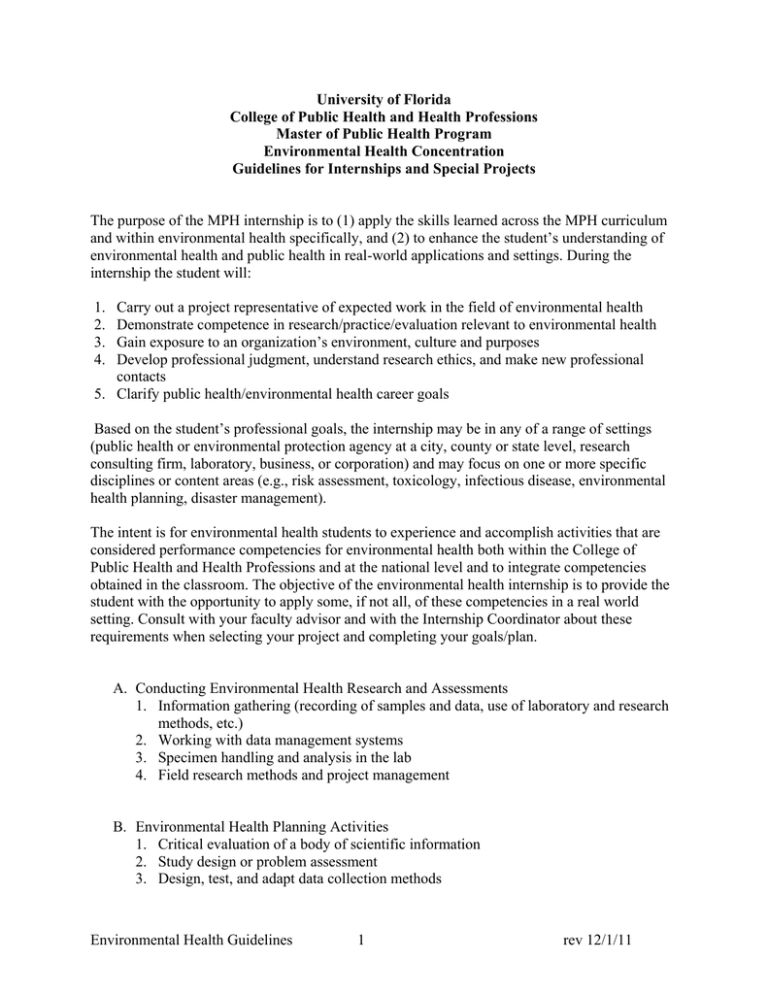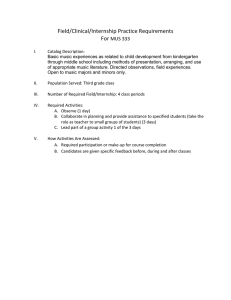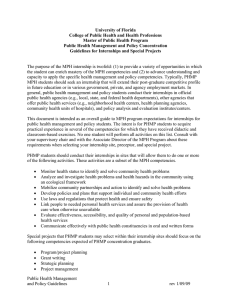University of Florida College of Public Health and Health Professions
advertisement

University of Florida College of Public Health and Health Professions Master of Public Health Program Environmental Health Concentration Guidelines for Internships and Special Projects The purpose of the MPH internship is to (1) apply the skills learned across the MPH curriculum and within environmental health specifically, and (2) to enhance the student’s understanding of environmental health and public health in real-world applications and settings. During the internship the student will: 1. 2. 3. 4. Carry out a project representative of expected work in the field of environmental health Demonstrate competence in research/practice/evaluation relevant to environmental health Gain exposure to an organization’s environment, culture and purposes Develop professional judgment, understand research ethics, and make new professional contacts 5. Clarify public health/environmental health career goals Based on the student’s professional goals, the internship may be in any of a range of settings (public health or environmental protection agency at a city, county or state level, research consulting firm, laboratory, business, or corporation) and may focus on one or more specific disciplines or content areas (e.g., risk assessment, toxicology, infectious disease, environmental health planning, disaster management). The intent is for environmental health students to experience and accomplish activities that are considered performance competencies for environmental health both within the College of Public Health and Health Professions and at the national level and to integrate competencies obtained in the classroom. The objective of the environmental health internship is to provide the student with the opportunity to apply some, if not all, of these competencies in a real world setting. Consult with your faculty advisor and with the Internship Coordinator about these requirements when selecting your project and completing your goals/plan. A. Conducting Environmental Health Research and Assessments 1. Information gathering (recording of samples and data, use of laboratory and research methods, etc.) 2. Working with data management systems 3. Specimen handling and analysis in the lab 4. Field research methods and project management B. Environmental Health Planning Activities 1. Critical evaluation of a body of scientific information 2. Study design or problem assessment 3. Design, test, and adapt data collection methods Environmental Health Guidelines 1 rev 12/1/11 4. Group meetings, formal planning work — Delphi methods, interviewing experts, etc. 5. IRB preparation and activities C. Data Management, Analysis, and Interpretation 1. Designing data collection or data entry systems 2. Statistical data analysis 3. Creating tables, graphs, charts of analyses and findings 4. Writing data or data interpretation methods D. Communication and Collaboration 1. Routine memos, forms, files, calls, and electronic communications with team and others for the internship 2. Written reports and findings 3. Graphics, slides, or the aids in communicating results 4. Oral presentations 5. Disseminating results, e.g., stakeholder feedback, newsletters, reports to subjects, etc. 6. Work with a lab, clinic, research group, public health organization 7. Integrate activities at more than one level, e.g., investigator and department, local and global, community and individual, laboratory and population, etc. Environmental Health Guidelines 2 rev 12/1/11




